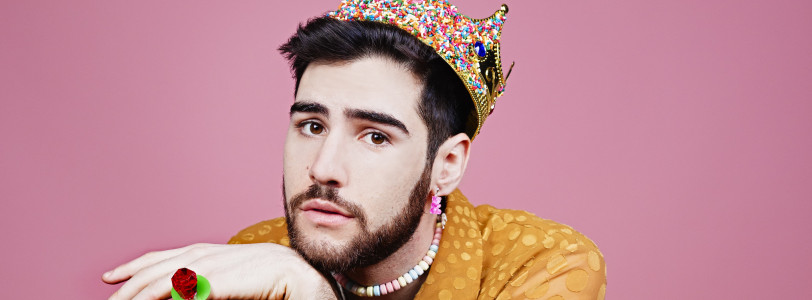Could you first introduce yourself to the reader?
I’m an anxious gay diabetic Jew from Florida currently residing in New York City. I enjoy chess, puns, and playing frisbee with my least athletic friends. I’m very famous.
How would you describe your show?
Sugar Daddy is about meeting my partner Jonathan, and then my relationship to grief after his passing to COVID in 2021. It’s a series of funny stories that I hope paints a picture of what it’s actually like to grieve someone you love. I’d describe it as silly, hopeful, poignant, kinda horny, a little gross, angsty, spiritual, and grounding.
Why do you want to perform at Edinburgh Festival Fringe?
Anything goes!
Finding theme and narrative that say something meaningful in an hour is the most gratifying part of performance for me. That is discouraged in US comedy and encouraged in UK comedy. With this show, focusing my grief into comedy has been a helpful and productive coping mechanism, especially because I struggle to talk about it off stage, but for some reason I can on. I know that there is value in grief comedy because of how people have connected to and reacted to the show... but it’s near impossible to work it out in NYC clubs.
What differentiates it from other festivals?
Edinburgh is the only festival outside the US I’ve ever done. US festivals are nothing like Edinburgh - they're usually made up of many up-and-coming comedians doing short sets over the course of a weekend, mixed in with a few big name draws.
What first motivated you to enter the industry? Who were your inspirations?
My biggest inspirations were probably Mike Birbiglia, Margaret Cho, Tig Notaro, Bo Burnham, John Leguizamo....and many, many more. I was obsessed with writing and acting in theatre in college and then I just got addicted to open mics when I moved to New York City. Shortly after, with the help of a few older comedians, I realized you could actually make a career out of stand up.
How has your background, upbringing and education had an impact on your artistic career? What is your earliest childhood art memory?
I was in Pre-K (age 4) at Temple Beth Shalom in Sarasota, FL. I remember doing several art projects, but the one I remember most vividly was...a bubble fight? I believe we just kind of attacked each other with bubbles. And now that I’m typing this out I’m realizing, this was most likely not an officially sanctioned Temple Beth Shalom activity and I probably just started attacking my friend Mike with bubbles.
Did Covid-19 change the way you create work? Do you approach shows with a different mentality now?
Losing stand up made me value how much I love, appreciate, and need stand up. It really made me question what about it is so important to my mental health. I heard from Mike Birbiglia on a podcast something that really clicked – it doesn’t matter what stage of your career you’re in, just do what you want to do. Don’t wait for a big break or permission from any gatekeepers. Honestly, I think the biggest thing is just that I grew as a person. I came out of the pandemic with a better sense of myself, which allowed me to be more comfortable being myself, and vulnerable on stage.
I think because of these things, I was able to tackle grief comedy when my partner passed. I think for grief comedy to work, the audience has to really trust that I’m okay, before they can feel comfortable laughing. Ironically, I find the best way to do that is being very open and vulnerable about how I am not okay. If I’m able to be open enough, they’ll follow me anywhere and it’s very cathartic and a little magical.
Describe the last year in 5 words or less?
Love, loss, and diabetes.
Do you subscribe to the idea that art should be exempt from ‘cancel culture’?
Of course not. Art should always be critiqued. I think when the larger public starts having discussions about a single person’s mistake, it can be productive. Especially when it teaches us how to respect each other a little more.
What I’m not a fan of is the internet. Too many people at once, too anonymous, and too overly stimulated. I’ve gone viral many times and when people get mad about anything, it’s suddenly thousands of people saying incredibly personal and mean things to you. Individually any of these things are not harmful, but the sheer volume of it all, wears on your psyche, and is rarely anything but painful.
What advice would you give to someone who wants to take a show up to the fringe?
Obviously you have to talk about trauma!! ;)
Coming in know what you want to get out of it, but also expect that will change. And watch a lot of shows not in the genre you’re performing!
When and where can people see your show?
Gilded Balloon Teviot Balcony Room at 6.20 (3 - 29 Aug, not 15/22)
And where can people find, follow and like you online?
TikTok, Instagram, Twitter: @samuelhmorrison Website: www.samuelmorrison.com
Sam Morrison’s new stand up show Sugar Daddy will be at the Gilded Balloon Balcony at 6.20pm for the month of August for tickets go to www.edfringe.com









0 Comments